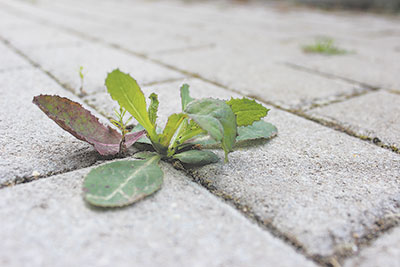The controversy surrounding the use of glyphosate-based herbicides continues as councils assess their use of the products to control weeds in parks, streets, playgrounds and open spaces.
Australia’s first lawsuit has been launched asserting a link between Roundup, the active ingredient of which is glyphosate, and Non-Hodgkin lymphoma diagnosed in a Melbourne landscape gardener who used the product at work for 18 years.
The landmark news comes on the tail of three successful lawsuits in the United States (US) against Bayer AG, parent company of Monsanto, the maker of Roundup.
Compensatory and punitive damage payouts in the vicinity of $US80 million were awarded in each case against the company which was found to be negligent in failing to adequately warn consumers of cancer risks posed by the product.
In the wake of the US lawsuit the Victorian Government announced an internal review of its storage and handling of products containing glyphosate.
Under the gathering cloud of potential class action in Victoria, Moyne Shire in Victoria’s southwest has cut Roundup and nine other herbicides from its maintenance stores so that it now stocks only three products containing glyphosate for specific applications.
In New South Wales, more than 500 Blacktown City Council workers walked off the job last month over claims that they were being forced to use products containing glyphosate including Roundup.
An agreement was reached between the United Services Union and Council which will see the trial of a viable alternate weed control product. Council has previously offered to undertake such a trial.
The trial will involve one of Council’s crews using the alternate product. Other crews will continue to use the glyphosate-based product under strict conditions in accordance with the label directions.
The trial will be monitored by Council’s Work, Health and Safety Representative Committee.
Blacktown City Mayor, Stephen Bali MP, said, “We place the safety of our staff and the community as our highest priority.
“Council has consulted with staff and unions on the use of glyphosate extensively.
“Council is continually monitoring the situation and will act according to the recommendations of the regulator and on the findings that result from the trial.
“We have agreed to trialling viable alternatives. What is important for everyone to understand is that Council will not place employees or members of the public at risk,” Mayor Bali said.
Council is guided in this by the relevant regulatory authority, the Australian Pesticides and Veterinary Medicines Authority (APVMA) which maintains glyphosate is safe to use in accordance with the manufacturer’s instructions.
Fairfield City Council has stopped using Roundup and Georges River and Randwick councils are phasing it out.
Eight other Sydney councils, including Willoughby, Ku-ring-gai, Sutherland Shire and Waverley, are conducting reviews.
Other councils continue to use Roundup, following the official advice of the national pesticides regulator.
The NSW National Parks and Wildlife Service use glyphosate-based weed control measures throughout national parks in Sydney.
Colac Otway Shire Council, Victoria, is continuing its investigation into weed control options with an onsite demonstration of the latest steaming treatment to tackle weeds and reeds.
Chief Executive Officer, Peter Brown, said Council was continuing to minimise the use of glyphosate because of public concern regarding its use, along with pursuing other weed control options, including steam.
“We are actively monitoring what is happening at other councils and the State Government review of the use of chemicals to treat weeds.
“Council had previously considered steam weed control and as technology has improved, we have taken the next step of trialling the non-chemical method in particularly sensitive areas such as playgrounds.
“We are also monitoring other agencies’ use of chemicals and alternative methods, particularly the Department of Environment, Land, Water and Planning and large rural councils which have similar challenges to Colac Otway.
“Council is looking into why councils that had previously trialled non-glyphosate treatments had not continued with other options.
“The trials will aim to find the balance between using steam and organic treatments, while maintaining Council land to the meet the community’s expectations on Council’s limited budget.
“Meanwhile Council will continue to minimise use of glyphosate and continue to store and use it in accordance with a Safety Data Sheet.
“Use of this chemical is also managed by a Safe Work Method Statement for Weed Spraying which specifies the use of Personal Protective Equipment.”
In 2015, a report from the World Health Organisation’s International Agency for Research on Cancer concluded that the chemical was ‘probably carcinogenic to humans’.
Since then a number of countries and city authorities in Europe, Asia and North and South America have implemented timelines to phase out or restrict the use of glyphosate.

















